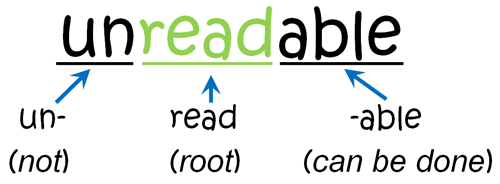Top Vocabulary Building Tips for SSC Aspirants
Learning is a continuous process and excellence in any field can be
achieved only through dedication and intense hard work. In order to improve your vocabulary for SSC exams, you must have a meticulous and well-structured
study plan that ensures proper practice and covers all the aspects of the
English language, right from learning the word origins and their roots, to
understanding the semantics and usage in different contexts. Here the top
vocabulary building tips you can inculcate in your study plan to succeed in the
SSC exam:
Tip
#1 Understand the root words
If you learn and understand the root words then take it a guarantee
from us that not only your vocab will improve significantly and you will learn
new words at a quick pace, but you also won’t forget those words for a long
time. Dissect a word, understand what it is made of i.e. prefix-root-suffix. In
that way, you will also be able to identify and link the same word root to
other words, thus making it easier for you to understand how different words
are constructed.
E.g. ‘Poly’
is a Greek word that means many.
‘Gam’ means marriage
‘Gyn’ means woman
‘Andr’ means man
So, poly+gam= Polygamy literally means many marriage, meaning the act of being married several times.
In the same way, Polygyny means marriage with several women, and Polyandry means marriage with several men.
‘Gam’ means marriage
‘Gyn’ means woman
‘Andr’ means man
So, poly+gam= Polygamy literally means many marriage, meaning the act of being married several times.
In the same way, Polygyny means marriage with several women, and Polyandry means marriage with several men.
It is strongly recommended to purchase ‘Word Power Made Easy’ by Norman
Lewis if you want to properly learn about word roots.
Tip
#2 Learn the origins of words
The English language has a fascinating history that intertwines both historical and sociocultural contexts. Learning the etymology of different words and phrases, and how their meaning changed over history is a very effective way to improve your vocabulary.
E.g. Did you know that the word ‘Sandwich’ gets its name from the 4th
Earl of Sandwich, John Montagu? History has it that around 250 years ago, the
aristocrat was playing card games with his friends and did not want to get his
hands greasy, so he asked his valet to bring him beef between two slices of
bread. Montagu’s friends asked for the same and thus a new convenience food was
born.
Another one- checkmate comes from the Arabic word ‘shah mat’, which means the king is dead.
Another one- checkmate comes from the Arabic word ‘shah mat’, which means the king is dead.
Tip
#3 Relate the words you learn to visuals
You must have heard of the English idiom- ‘a picture is worth a
thousand words’. The same mantra applies here. Whatever word you learn, try to
relate it with a particular image. Use mnemonics. Our brains are wired to remember
visuals more easily than text, so you can easily retain the word once you have
made the association.
E.g. A complicated word like ‘ineluctable’ means something which cannot be escaped or avoided. If you relate it to an image of a luck table and connect it with the following sentence- ‘They had ineluctable chances of winning on the luck table’, then you will manage to remember it in a better way.
Or, you can simply associate words with images, like if you want to remember ‘bona fide’, which means authentic, genuine, then you relate it with some brand like Apple or personality like Mahatma Gandhi to retain the meaning.
E.g. A complicated word like ‘ineluctable’ means something which cannot be escaped or avoided. If you relate it to an image of a luck table and connect it with the following sentence- ‘They had ineluctable chances of winning on the luck table’, then you will manage to remember it in a better way.
Or, you can simply associate words with images, like if you want to remember ‘bona fide’, which means authentic, genuine, then you relate it with some brand like Apple or personality like Mahatma Gandhi to retain the meaning.
Tip#4
Play interesting word games
There are many interesting word games that you can play both offline and online to improve your vocabulary. Hangman, crossword, scrabble, jumbled words etc make the learning process more entertaining and satisfying than merely mugging up or learning by rote.
Tip
#5 Read more, more, and still more
Reading is the best time-tested solution of improving your
vocabulary for SSC as it allows you to understand the different contexts in
which particular words are being used. You can relate better with the words you
learn and identify similar situations and writings and the meaning they intend
to convey. To improve English from any aspect and attain long-term success, you
absolutely need to inculcate a reading habit. Read magazines, newspaper
editorials, fiction, non-fiction…anything you can get your hands on.
Tip
#6 Create sentences, don’t cram words
A big mistake many students make while attempting to improve their vocabulary is to cram as many words as possible and learn their meanings. What are you trying to do? Write your own version of the Oxford dictionary? DO NOT cram up a huge database of words, rather work assiduously towards understanding the meaning of each through sentence creation and learn how their meaning varies from context to context.
Tip
#7 Learn through repetition
Learning once is not enough. Your plan for vocabulary improvement should
have ample space for practice exercises and this should be done on a regular
basis. Research shows that any information presented to you is 50% forgotten
within one hour, 70% within 24 hours, and more than 90% in a week. You need to
practice daily and eventually it will become a good habit.









Comments
Post a Comment